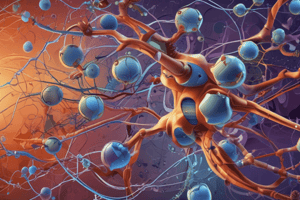Podcast
Questions and Answers
What is the primary function of sodium in maintaining cellular homeostasis?
What is the primary function of sodium in maintaining cellular homeostasis?
- Stimulating nerve cell excitability
- Regulating blood pressure
- Transporting nutrients through plasma membranes
- Maintaining fluid and electrolyte balance (correct)
What happens to cells when there is too low sodium in the serum?
What happens to cells when there is too low sodium in the serum?
- Cells swell due to water entry (correct)
- Cells become dormant
- Cells shrink due to water loss
- Cells start dividing rapidly
What is the term for having too low sodium levels in the serum?
What is the term for having too low sodium levels in the serum?
- Hyponatremia (correct)
- Electrolyte disorder
- Hypernatremia
- Sodium imbalance
Where is sodium mostly found in the body?
Where is sodium mostly found in the body?
What is the primary way that sodium is excreted from the body?
What is the primary way that sodium is excreted from the body?
What is the role of sodium in nerve cells?
What is the role of sodium in nerve cells?
What is the primary cause of Hypernatremia?
What is the primary cause of Hypernatremia?
What is the relationship between sodium and potassium in the body?
What is the relationship between sodium and potassium in the body?
What is the primary function of potassium in the body?
What is the primary function of potassium in the body?
What is the consequence of low potassium levels in the blood?
What is the consequence of low potassium levels in the blood?
What is the primary source of magnesium in the body?
What is the primary source of magnesium in the body?
What is the role of magnesium in the body?
What is the role of magnesium in the body?
What is the consequence of high potassium levels in the blood?
What is the consequence of high potassium levels in the blood?
What is the relationship between potassium and sodium in urine excretion?
What is the relationship between potassium and sodium in urine excretion?
Flashcards are hidden until you start studying
Study Notes
Sodium
- Found mostly in blood and extracellular fluid (ECF)
- Excreted mostly in urine
- Physiological functions:
- Maintains normal cellular homeostasis
- Regulates fluid and electrolyte balance and blood pressure
- Transports nutrients and substrates through plasma membranes
- Essential for the excitability of muscle and nerve cells
- Diseases associated with sodium:
- Hyponatremia (low Na in serum): water enters cells, causing them to swell
- Hypernatremia (high Na in serum): water leaves cells and enters blood, causing dehydration
- Excessive sodium intake: facial puffiness, high blood pressure, heart disease, and stroke
Potassium
- Found mostly inside cells, present in all body tissues
- Excreted mostly in urine, with some in sweat and stool
- Strong relationship with sodium
- Physiological functions:
- Essential for normal cell function
- Maintains intracellular fluid volume and transmembrane electrochemical gradients
- Helps preserve acid-base balance and maintain isotonicity and electrodynamic cellular function
- Activates many enzymes, such as pyruvate kinase
- Essential for transmission of nerve impulses, contraction of cardiac muscles, skeletal and smooth muscles, and tissue synthesis
- Relaxes walls of blood vessels, lowers blood pressure
- Diseases associated with potassium:
- Hypokalemia (low K in blood): excessive K loss in urine, low K intake, associated with increased blood pressure and higher risk of stroke
- Hyperkalemia (high K in blood): life-threatening, can cause reduced heart muscle activity, weakness, and paralysis
Magnesium
- 50% of body's magnesium is in bone, very little in blood
- Physiological functions:
- Cofactor in various structures/enzymes that regulate reactions
- Essential for protein synthesis, muscle and nerve function, and blood pressure regulation
- Required for energy production, oxidative phosphorylation, and glycolysis
- Regulates insulin secretion in pancreatic beta cells
- Critical for phosphorylation of insulin receptor
- Contributes to formation of bone and teeth
- Diseases associated with magnesium:
- Hypomagnesemia (low Mg levels)
Studying That Suits You
Use AI to generate personalized quizzes and flashcards to suit your learning preferences.



